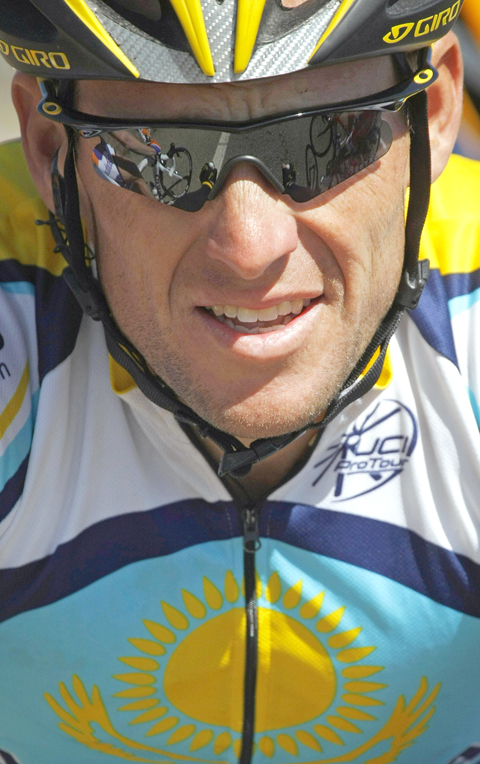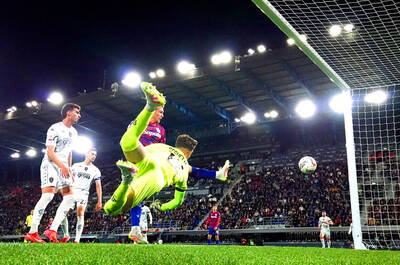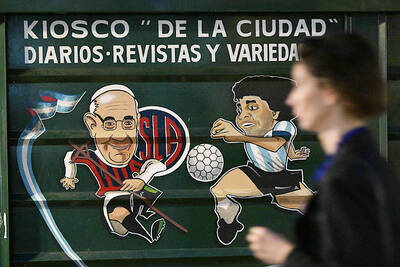Although some have made light of it, Lance Armstrong’s latest run-in with French anti-doping authorities is no joke.
At worse, the French say, they have the power to suspend the seven-time Tour de France champion from competing in the country for supposedly having kept a drug tester waiting. That would certainly take the shine off Armstrong’s comeback that has pulled in publicity and crowds for his battered sport.
Even if it doesn’t come to sanctions, the French anti-doping agency’s suggestion that Armstrong didn’t cooperate fully with their tester could again mean that he’ll compete at this year’s Tour under a cloud. Unless, of course, the claims cause him to simply throw up his hands and say: “You know what? Forget your Tour. I don’t need this.”

PHOTO: AP
He’s dropped that hint before.
Seems we’re right back where we were in 2005, when he quit the sport — temporarily as it turned out — railing against the “cynics and the skeptics” who simply don’t buy the tale of the cyclist who survived cancer to win the world’s toughest bike race a record seven years in a row — without, he insists, using illegal drugs.
Armstrong’s push this year for an eighth Tour title was meant to be the highlight of his return after a three-year hiatus.
But instead, if the contentious drug-test affair is still unresolved by then, he could spend time in July having to answer yet more doping questions. It is not the good publicity he hoped for when he climbed back into the saddle to spread the word about fighting cancer and to see whether, at age 37, he’s still a winner.
The prospect for fans of cycling and of Armstrong — often two diametrically opposed groups of people — is confusion.
There is such bad blood between Armstrong and the French agency and such wide differences in their accounts of what happened on March 17, when the agency dispatched its most trusted tester to knock on the rider’s door, that we may never feel that we have gotten the whole truth.
Again, it could come down to who you believe — Armstrong or skeptical French officials who doubt his exploits and have suggested but never proved that he cheated in the past.
This time, both sides can be faulted.
Keeping a tester waiting is a big deal, invariably raising suspicions that an athlete might be hiding something, maybe that he needed a few minutes in the toilet to mask traces of doping.
Armstrong’s been in cycling since he was a teenager. He claims to be one of the most tested athletes on the planet and he has long suspected that some in France have it in for him. So one might think that he’d have been extra, extra careful not to put even a toe wrong when he went to the south of France in March to train.
With hindsight, the smart thing to have said when the tester appeared, asking for urine, blood and hair samples, might have been: “Come right in. I’ll roll up my sleeve for the needle right now.”
Instead, Armstrong says the testing was delayed for 20 minutes while his team manager, Johan Bruyneel, checked that the tester was bona fide and not “just some French guy with a backpack and some equipment.”
Armstrong says the tester let him go inside and shower while Bruyneel made his calls.
Armstrong says one reason he questioned the man’s authority was “I was unaware that in France the government tests athletes and takes the position it can test any athlete residing in or visiting France.”
Ignorance is not a solid defense.
For its part, the agency can be questioned about the glee with which it announced that it had cornered Armstrong for the unannounced test. This wasn’t merely about seeing whether Armstrong is clean, it was a message: In France, you’re on our turf and you’ll get no special treatment.
“He needs to know that he is like everyone else,” said the agency’s president Pierre Bordry, which sounds distinctly as if Armstrong was specifically targeted and therefore is not simply like everyone else.
At the agency, the version of events is that only when the tester threatened to call in gendarmes did Bruyneel agree to let testing proceed and the French official pooh-poohed Armstrong’s claim that the tester let him shower. The tester reported that he repeatedly warned Armstrong that he had to keep him within his sight at all times.
The agency says it hasn’t decided whether to launch disciplinary proceedings. But Bordry seemed to hint that it might, saying he didn’t want to comment because “we are entering into a contentious phase, or likely to be contentious.”

Bologna on Thursday advanced past Empoli to reach their first Coppa Italia final in more than half a century. Thijs Dallinga’s 87th-minute header earned Bologna a 2-1 win and his side advanced 5-1 on aggregate. Giovanni Fabbian opened the scoring for Bologna with a header seven minutes in. Then Viktor Kovalenko equalized for Empoli in the 30th minute by turning in a rebound to finish off a counterattack. Bologna won the first leg 3-0. In the May 14 final in Rome, Bologna are to face AC Milan, who eliminated city rivals Inter 4-1 on aggregate following a 3-0 win on Wednesday. Bologna last reached the

If the Wild finally break through and win their first playoff series in a decade, Minnesota’s top line likely will be the reason. They were all over the Golden Knights through the first two games of their NHL Western Conference quarter-finals series, which was 1-1 going back to Minnesota for Game 3 today. The Wild tied the series with a 5-2 win on Tuesday. Matt Boldy had three goals and an assist in the first two games, while Kirill Kaprizov produced two goals and three assists. Joel Eriksson Ek, who centers the line, has yet to get on the scoresheet. “I think the biggest

From a commemorative jersey to a stadium in his name, Argentine soccer organizers are planning a slew of tributes to their late “Captain” Pope Francis, eulogized as the ultimate team player. Tributes to the Argentine pontiff, a lifelong lover of the game, who died on Monday at the age of 88, have been peppered with soccer metaphors in his homeland. “Francisco. What a player,” the Argentine Football Federation (AFA) said, describing the first pope from Latin America and the southern hemisphere as a generational talent who “never hogged the ball” and who showed the world “the importance of having an Argentine captain,

Noelvi Marte on Sunday had seven RBIs and hit his first career grand slam with a drive off infielder Jorge Mateo, while Austin Wynn had a career-high six RBIs as the Cincinnati Reds scored their most runs in 26 years in a 24-2 rout of the Baltimore Orioles. Marte finished with five hits, including his eighth-inning homer off Mateo. Wynn hit a three-run homer in the ninth off catcher Gary Sanchez. Cincinnati scored its most runs since a 24-12 win against the Colorado Rockies on May 19, 1999, and finished with 25 hits. Baltimore allowed its most runs since a 30-3 loss to